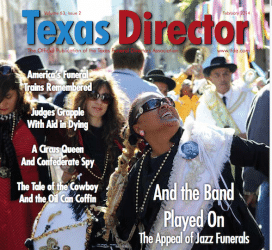Feb 20, 2014
7 Telephone Strategies for Growth
This article was originally published in the February issue of the Texas Director Magazine, a publication of the Texas Funeral Director’s Association.
At the NFDA convention in Austin, funeral professionals filled the room wall to wall to hear Speaker Lynn Elliott, CRME, talk about how to expand their reach and maximize the return on their marketing efforts. The class was so well attended it was offered at two different times. This hot topic is becoming increasingly important to funeral home owners who are looking for a competitive advantage in today’s unpredictable economic climate. There are a variety of different ways funeral directors can separate their firm from others in the area, from updating the chapel décor to creating a high-ranking website to making adjustments to the general price list. However, all of these efforts may go unrecognized if a family in need calls and does not receive a prompt and professional response.
Here are some strategies ASD recommends funeral professionals use to realize the potential value of every call and increase market share.
1. Assume Every Call is a First Call
In the funeral business, there is often no second chance to create a positive first impression. Today’s culture of instant results coupled with an increase in price-based funeral selection has led many consumers to base their funeral decisions on a single phone call. If a family hears a busy signal, voicemail or perpetually ringing phone when calling a funeral home during their time of need, it is highly likely they will contact a different firm and tell others about their negative experience. To protect new business opportunities, you must remain vigilant about your firm’s telephone activity. By creating a safety net of backup support through call forwarding and ASD, funeral professionals can ensure families always receive a prompt and professional response no matter the time or day.
2. Protect Calls You Can’t Answer
Instead of staffing the funeral home around the clock or remaining tethered to their desks, many directors have found freedom through call forwarding capabilities. Through your local phone company, you can program phone lines to ring to your cell phone or answering service if the call is not answered at the funeral home by a pre-determined number of rings. This allows a funeral home representative to be the first point of contact for families without risking a single missed call. No Answer Call Forwarding also ensures that callers will be transferred to a different number if your phone lines are affected by an unexpected power outage.
3. Never Rely Solely on a Cell Phone
Technology has certainly made our lives easier, but we’ve all experienced times when it has failed us too. If phone lines are forwarded to a cell phone, don’t allow a dead zone or weak battery to result in a lost business opportunity. Instead, program Cell Phone Backup Call Forwarding in advance through a cellular provider so calls are diverted to a foolproof number instead of a voicemail. Cell Phone Backup Call Forwarding also provides added flexibility to on-call directors by allowing them to decide if they are in an appropriate environment to handle the call. When on the road or in a meeting with another family, directors can send the call to the backup number instead without the risk of a lost business opportunity.
4. Track Pre-Need Leads
According to Citrin Cooperman’s 2011 Funeral Directors Survey, the value of pre-need accounts has risen significantly over the past several years. The survey found that on average, pre-need policies accounted for 83 percent of funeral homes’ annual revenue compared to 64 percent in 2010. As this trend continues, funeral professionals are putting increased focus on pre-need marketing and tracking valuable pre-need leads. ASD has specific solutions that allow its clients to monitor their pre-need calls. The company provides detailed reports that help owners and managers maximize pre-need leads that come in after hours.
5. Evaluate Your Staff
During Lynn Elliott’s seminar, “Insights and Tactics to Increase Your 2014 Market Share” at the NFDA convention, she explained why funeral directors must take an active role in monitoring their telephone patterns and evaluating their staff’s customer service. Lynn recommended the website, www.callrail.com, which allows users to track where calls originate and listen to recordings of their employees’ interactions with potential customers. While most modern answering services record calls answered when lines are forwarded, callrail.com is an excellent website for reviewing telephone activity when funeral home employees are handling calls.
6. Provide 24/7 Bilingual Support
According to the United States Census Bureau, more than 37 million U.S. residents speak Spanish and over 22 percent of Spanish-speaking residents do not speak English well or at all. From these numbers, one can conclude that Funeral professionals who cater to the Latino community by offering bilingual services have a major competitive advantage over those who do not. Whether the funeral home employs a Spanish-speaking staff or forwards to an answering service with bilingual capabilities, it is crucial that Latino families always feel valued when contacting a funeral home, day or night.
7. Develop a Communication Plan for After-Hour Removals
Coordinating after hour removals is one of the most stressful job requirements of a funeral director. Whether handling pickups or working with a transport company, it is vital that all First Call information is accurate and every dispatching procedure is followed. ASD has created customizable solutions for funeral homes and transport companies to coordinate removals. The company can notify multiple employees of a passing, contact a specific on-call person depending on the time or date and copy central dispatch so owners and managers always know the status of every call. By developing an after hours telephone strategy, funeral directors can greatly reduce the possibility of any miscommunication occurring during a removal.
For more on this topic, click here.
About The Author
Jess Farren (Fowler)
Jess Farren (Fowler) is a Public Relations Specialist and Staff Writer who has been a part of the ASD team since 2003. Jess manages ASD’s company blog and has been published in several funeral trade magazines. She has written articles on a variety of subjects including communication, business planning, technology, marketing and funeral trends. You can contact Jess directly at Jess@myASD.com


